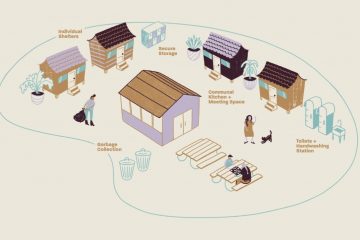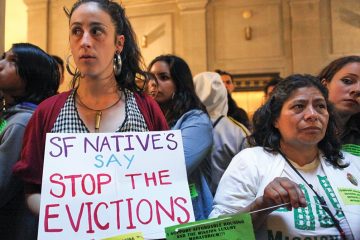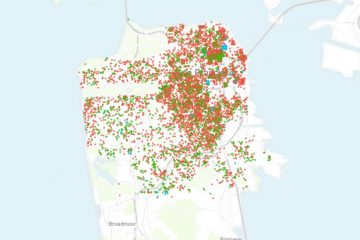Ask a Tenant Attorney: How to Protect Yourselves from Rent Increases
Ask a Tenant Attorney is your chance to learn how to survive as a tenant in San Francisco. In each edition Tenant’s Rights Attorney Daniel Wayne addresses a different issue for residential tenants. In this edition we discuss two laws tenants NEED to know in order to avoid losing their rent control. For more information about Daniel and his firm, Wolford Wayne LLP, check out their website at www.wolford-wayne.com. Have a suggestion for a landlord-tenant issue you want Daniel to address in the column? Send an email to alex@brokeassstuart.com and we will pass it along!

How San Francisco Tenants Can Lose Rent Control
Home is where the heart is right? Well if we are talking about what the law says then not quite.
For most of us, there is not a lot to it. You have one address. You sleep there, you get your mail there, and it’s listed as your home address on bills, tax returns and so on. But some tenants find their living situations more complicated, whether due to illness, work, travel, or just a series of misunderstandings. And in San Francisco, where rent control can be the difference between staying in the Bay and moving to North Dakota, the question of where a tenant’s principal residence is can become a point of contention — and can potentially cost tenants their homes.
If your landlord suspects you no longer “live” in your unit, they may be able to raise your rent to market rate. State and local law provide that a landlord may be entitled to an unlimited rent increase on a unit once: 1) the last original occupant moves out or, once the unit is no longer that tenant’s “principal place of residence.” Generally, when a master tenant or last original occupant has vacated the unit, OR 2) if the tenant is using the unit as something other than their “principal place of residence,”
Rent Board Rules and Regs. Section 1.21 and Costa Hawkins
There are two laws that trigger a landlord’s right to an unlimited rent increase. Those laws are Rent Board Rules and Regs. Section 1.21, and Costa Hawkins, a California State Law. Even if you still live in your home there are ways these laws can be used against you.
1.21 Petitions
Section 1.21 allows a landlord to impose an unlimited rent increase once a tenant is no longer “in occupancy.” Being “in occupancy” means that the unit is your principal place of residence. This law is meant to prevent tenants from, say, moving to Paris full-time but hanging onto a super cheap rent-controlled pied-de-terre in San Francisco.
While landlords understandably don’t want to miss out on getting more money for a place that their tenant doesn’t even live in, many landlords use this law as a weapon. If a landlord thinks you may not be living in your apartment / home for whatever reason, they can file a 1.21 Petition with the San Francisco Rent Board in order to raise the rent on an existing tenant to market rate.
We see this most often when there has been a change of ownership in a building. The new owner comes in and wants to maximize their return on investment so they perform an audit on the building to see if anyone may be skirting the law.
How does the landlord issue a 1.21 rent increase?
In order to issue a rent increase under 1.21, the landlord must first file a petition with the Rent Board, which then schedules a hearing. At the hearing, an administrative law judge will listen to both sides’ arguments, review their evidence, and determine whether a rent increase is in fact applicable. Because these petitions are filed by the landlord, the landlord has the burden of proving the property is not your primary place of residence.
Where your primary place of residence is, is evaluated by looking at a number of factors, including:
- What address is listed as the tenant’s place of residence on any motor vehicle registration, driver’s license, voter registration, or with any other public agency, including Federal, State and local taxing authorities;
- Whether utilities are billed to and paid by the tenant at the subject premises;
- Where the tenant’s keeps their personal possessions;
- If the tenant has taken a homeowner’s tax exemption for a different property;
- Where the tenant normally returns as his/her home, exclusive of military service, hospitalization, vacation, family emergency, travel necessitated by employment or education, or other reasonable temporary periods of absence; and/or
- Credible testimony from individuals with personal knowledge or other credible evidence that the tenant actually occupies the rental unit or units as his or her principal place of residence.
If the judge rules in the landlord’s favor, the landlord can impose the rent increase. Tenants do not have to pay the increased rent amount until the landlord has prevailed at the Rent Board. However, in cases where the landlord does prevail, the tenant is liable for that increase going back to the date it was first issued. (That is, if your landlord issued a $200 rent increase starting in September, and your case was tied up at the Rent Board until February, you might owe an extra $1,200, to make up for those six months that your landlord didn’t get the $200 increase.) Because of this, tenants who are fighting 1.21 rent increases should try to sock away money in case they end up losing their case and having to pay up.
Rent Increases Under Costa-Hawkins
Alternately, the landlord may issue a rent increase under Costa-Hawkins. Costa Hawkins, which tenant advocates attempted to repeal on last year’s ballot (Prop 10), basically says that once the last original occupant has vacated a unit, the landlord is allowed unlimited rent increases.
For example, say that three roommates move into a 2-bedroom together. After a couple of years, Roommate 1 moves out, then the next year, Roommate 2 vacates This leaves Roommate 3 as the last “original occupant” of the unit. Roommate 3 replaces her original co-tenants with new subtenants, and everyone happily maintains their rent control. But if Roommate 3 decides to move out, the landlord would be within her rights to issue Costa-Hawkins rent increase notice.
What does it mean to “vacate,” though? Often landlords try to get Costa-Hawkins rent increases simply because the last original occupant is traveling for work, or staying occasionally at a boyfriend’s. Or, even more sneaky – when an original occupant still lives at the property but is not on the lease agreement. In these cases, the original occupant needs to demonstrate that they still live there and/or that they are an original occupant.

How does the landlord issue a Costa-Hawkins Rent Increase?
Unlike the 1.21 petition, which requires approval of the Rent Board to go into effect, a landlord can simply send a tenant a 60 Day Notice of Rent Increase pursuant to Costa-Hawkins without proving anything. This means that the burden is on the tenant to challenge the rent increase. This is done by filing a petition with the Rent Board for an Unlawful Rent Increase. Once that petition is filed, the Rent Board will notify the landlord and schedule a hearing. Just like the 1.21 petition, each side will have a chance to submit evidence and argue their case, though with a Costa Hawkins petition the tenant has the burden of proving the notice is invalid.
If possible, tenants who believe the rent increase notice is invalid should still pay the higher rent amount demanded by the landlord once it goes into effect. You’ll get that money back if you prevail at the Rent Board. If you refuse to pay your landlord the full rent amount demanded, you might face a 3-Day Notice to Pay or Quit, followed by an eviction lawsuit.
How Can You Avoid This Situation?
So both the Costa-Hawkins and the 1.21 Petitions hinge on whether the unit is your principal place of residence. But what counts as a principal place of residence? There’s no simple answer, and it’s ultimately up to the Rent Board to decide.
Being “in occupancy” doesn’t mean that you never travel. It doesn’t even mean that you sleep in your apartment most nights. It simply means that your apartment is your “usual place of return.” In other words, when you’re not traveling for vacation or family matters, or staying elsewhere as required by hospitalization, school, or work (or military service, jail, or prison), you generally end up back at your apartment.
Even if you have good explanations for why you changed your mailing address, moved items elsewhere, or registered your car / to vote elsewhere, these are hurdles you will have to be able to overcome. While it may not seem like a big deal, you can potentially save yourself grief (and money) if for example, you don’t change your home address on your car registration, voter information, bank statements etc., and don’t change your mailing address.

What evidence can sink your case?
Landlords often hire private investigators who can run detailed background checks on tenants. If you own property, or register to vote elsewhere, this will almost certainly show up on a background check. Often times running a background check is all a landlord will do before sending a rent increase notice. Sometimes however, private investigators will stake out an apartment building, take photos of residents coming and going, and interview neighbors. Yes. It’s creepy.
If you’ve sublet your place to a friend/ third party, or if your voter registration and car insurance shows you living in Mendocino, they’ll probably find out — and it won’t look great for your case.
And if you own property elsewhere, they may dig up those records. Tenants don’t need to be too concerned about owning an out-of-town vacation home or rental property. However, many homebuyers unthinkingly take a homeowner’s tax exemption on that property (which involves certifying that you live full-time at the property you own). In our experience, this is one of the worst choices a tenant can make. If you’re the primary occupant of a rent-controlled apartment, and you’re receiving a tax break on a different property meant for homeowners, it can be hard to convince a judge that you’re not playing fast and loose with the rules.
By knowing what the Rent Board will be looking at to determine where you live, tenants can (hopefully) avoid finding themselves having to fight to maintain their rent control. Ultimately, if you don’t live in your apartment there’s only so much you can do. The laws around rent control are set out to protect those who DO live in their homes, not those who do not.








